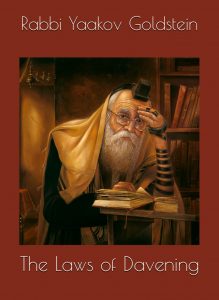*As an Amazon Associate I earn from qualifying purchases.
- How loud:[1]
Minimum loudness: One must pray loud enough for his ears to hear what he is saying. If one verbalized the words very quietly to the point that his own ears could not hear his words, then he nevertheless fulfills his obligation.
Maximum loudness: Although it states in the Talmud and Poskim that one is not allowed to pray out loud, this refers specifically to the prayer of Shemoneh Esrei, while by the other sections of prayer, not only may one pray them out loud, but furthermore is encouraged and praised for doing so. Furthermore, even regarding Shemoneh Esrei it is ruled that one may pray out loud for the sake of increasing his concentration, if he is not present by a minyan, and thus certainly one may and should pray the other sections of prayer out loud for the sake of increasing concentration, and doing so is permitted even when one is with a Minyan. Nonetheless, one should not scream the prayer in a way that will disturb everyone else’s concentration. The recommended Chabad custom, which follows the directives of the Chabad Rabbeim, is to pray out loud in order to help with one’s concentration.
Shema:[2] Some write that the entire Shema is to be said quietly aside for the first verse.
Shemoneh Esrei:[3] One may not Daven Shemoneh Esrei loud enough for a person who is standing past 4 cubits from him is able to hear him. Furthermore, the Sages instituted that a person is to pray in complete silence, that only his own ears hear what he is saying in order not to embarrass the transgressors which confess their sins in their silent prayer. Anyone who prays aloud is of those who lack faith as he shows with such action that so to say G-d will not be able to hear him if he prays silently.
___________________________________________[1] Admur 101:2-3; Brachos 31a; Yerushalmy Brachos chapter 4; Tur/Michaber 101; Shlah p. 250a; M”A 101:3; Kaf Hachaim 101:57; Piskeiy Teshuvos 51:20; Tanya Igeres Hakodesh 22; Tanya Kuntrus Achron-end; Igros Kodesh Admur Hazakein letter 10 and 82; Mittler Rebbe: Toras Chaim Parshas Teruma p. 309; Igros Kodesh Admur Haemtzai p. 263; Toras Chaim Pekudei p. 458; Shaareiy Teshuvah 43; Sichos Kodesh 5752 Parshas Beshalach p. 594
[2] Ketzos Hashulchan 19 footnote 54
[3] Admur 101:2-4; Ketzos Hashulchan 20:17


 Donate
Donate

Leave A Comment?
You must be logged in to post a comment.